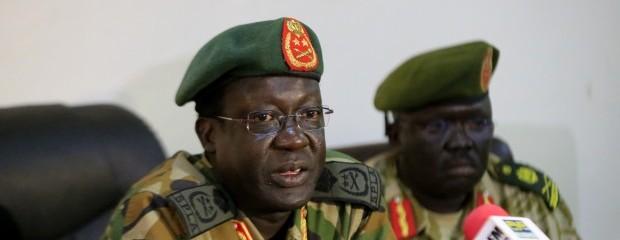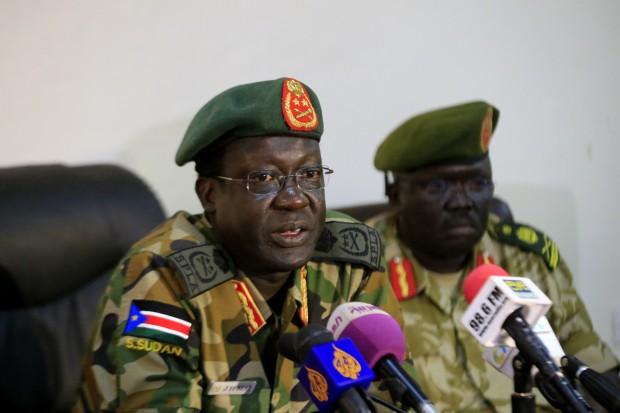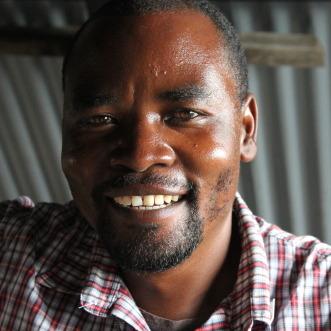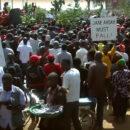Choosing to be a Dinka: selecting ethnicity remains an elite privilege


Chief of Staff of South Sudan’s army, General James Hoth Mai, is often held up as an example of someone who had refused to take sides on ethnic grounds between the Dinka and Nuer .
“Yin acÉ”l?” means “˜What is your name?’ in Dinka. They say that in Juba in December 2013 people were asked this question. If you could not answer, then you were shot.
There is a pervading narrative now that hundreds of Nuer were targeted in Juba by a Dinka dominated government. Ethnicity determines whether you were the victim or the aggressor – highlighting ethnicity’s relationship to violence in South Sudan. Ethnicity, in this case, was determined by language. Others were assumed to be Nuer based on their area of residence.
Violence first erupted in Juba on the 15th December 2013 inside the presidential guard. It quickly engulfed the city. Within ten days, the conflict had spread across the eastern side of South Sudan with large battles occurring in Bor, Malakal and Bentiu. Many soldiers defected to join the ranks of the opposition, challenging government authority in their locality and violently seizing control. The fear of targeted Nuer persecution prompted many Nuer soldiers, commanders and people in the home communities to mobilize militarily against the government. This formed the heart of the opposition and allowed the conflict to spread across the country in just a few days.
The conflict quickly adopted an ethnic appearance – a violent Nuer opposition to a Dinka dominated government. In South Sudan few doubt the political and military saliency of ethnicity. Fighting occurred on a larger scale in areas where Nuer and Dinka reside together, such as in urban centres and in SPLA barracks.
Seeking instant identification in Juba, language was used to distinguish Nuer from Dinka. Yet, language itself provided no clear distinction.
For example, whilst they are considered Dinka, the Atuot of northeastern Lakes State speak a language of their own that more closely resembles Nuer. This is the home community of Telar Deng (a close presidential advisor), and the Atuot were not the target of government. Yet, their language nearly allowed them to be mistaken for the other group.
Many privileges distinguish the elite in South Sudan. One such thing is that their political-military alliance has also become part of ethnic identification for the elite. When violence erupted in December 2013, both the government and opposition were eager to highlight that the conflict was not ethnic. To do this they listed examples of the range of ethnic groups represented by the elite in their group. Yet, a more common local explanation in South Sudan is not to recognize this multiplicity of ethnicities but to describe the changed ethnicity of the person who picks an alliance that it not consistent with the majority of his ethnic group. A person “˜becomes’ a Dinka if he supports the Dinka president.
The Economist reported that James Hoth Mai (SPLA) is an example of someone who had refused to take sides on ethnic grounds between the Dinka and Nuer. Yet, for many in South Sudan, James Hoth’s ongoing presence in the SPLA is equivalent to government support. This makes him a Dinka.
This is not the first example of the reconstruction of elite ethnicity in South Sudan in the context of the political dynamics of the SPLA. Much ethnic construction has taken place over time drawing on symbols associated with ethnicity to reconstruct identity. Ethnicity is often associated with language, culture and lineage. The assumption that these characteristics are relatively inflexible creates notions of the static, long-term nature of ethnic identity and loyalty based on ideas of ethnicity.
During John Garang’s leadership of the SPLA he sought to create long-term, static loyalties to himself and his leadership through construction of identities that drew on ethnic ideas. Garang reconstructed the ethnicity of the Garangists (people close to Garang) as Dinka not just through promotion but through drawing on symbols associated with ethnicity. One task was to try to unify the Dinka including those from Jonglei and Bahr el Ghazal. Yet, beyond that, he also wanted to incorporate into a more Dinka-aligned identity those who he trusted and promoted.
People promoted into the leadership of the SPLA by Garang, and who became dependent on his patronage for their success, were known as Garangists. Many Garangists and other soldiers in the SPLA learnt the Dinka language. This promoted identity with Garang but was also a practical decision for many soldiers to allow them to understand communications and avoid marginalization. Learning the language allowed them to assimilate into the Dinka identity and benefit from any preferential treatment.
In addition, Garang sought to include many of these Garangists in his family through marriage and when opportunities for marriage were exhausted in his own family, he used the female relatives of close, trusted army commanders. This drew on traditional social obligations amongst the Dinka and other South Sudanese communities that would tie the children of these marriages and, therefore, the family as a whole to relationship with Garang.
James Hoth’s association with the Dinka identity has taken place over time. Born as a Jikany Nuer from Ulang, he joined Garang’s SPLA in the earlier years at the time of his graduation from the University of Malakal in 1983. He was trained in both Ethiopia and Cuba, and became one of the key Garangists. Hoth is also married to a Dinka Ngok from the Abyei region, a Dinka group long associated with Garang. In the 1990s, when many Nuers defected, he remained loyal to Garang and his SPLA. This was perceived by many as Hoth’s denial of his Nuer identity in favour of a Garangist or Dinka identity. It is even said that Hoth turned down the Vice Presidency in 2013 as he did not believe he represented the Nuer community and would not be accepted by them as their representative.
Since 2005, increasing Nuer soldiers, including many formal rebel groups, have been absorbed by Kiir into the SPLA. For example, the Juba Declaration in 2006 incorporated the large South Sudan Defense Force under the leadership of Paulino Matip into Kiir’s SPLA. However, Kiir did not seek to craft a longer-term loyalty drawing on ethnic narrative during this integration. In a new time of prosperity with the control of much oil wealth, maybe he was confident that financial incentives would be enough to glue the elite together. Yet, with the turning off of the oil and the eruption of violence in December 2013, these loyalties seem less secure. Garang’s introduction of the reimagining of ethnicities appears to be a more stable strategy of control.
With shifting political alliances, people also selectively highlight lineages to reconstruct their identity. For example Riek Gai is usually described as a Nuer and has become President Kiir’s leading Nuer figure. Yet, now, many Nuer are highlighting his Dinka origins. Riek Gai is from a Dinka family that, generations ago, assimilated into the Jikany Nuer. While assimilation into the Nuer usually prompts a permanent description as Nuer, his current alliance with a Dinka president prompts people to highlight his Dinka lineage and identity.
Yet, while these known personalities appear to have the space to select their ethnicity, most in South Sudan have no such option. In Juba, Bentiu, Bor and Malakal since December 2013, many were killed because of the language they could not speak. With assumptions of association between ethnicity and territory, many were killed because of the area they lived in. Villages were burnt to the ground because they were Nuer or Dinka. Government forces killed Nuer chiefs who had been active in serving the government and had historically questioned the Nuer opposition.
Yet, despite their political alliance, their ethnicity did not change. They were Nuer and assumed to be in opposition. They had no option to change sides and were perceived as a legitimate target for violence. For the anonymous majority, there is no ability to select ethnicity. It is even difficult to select political alliance. The last two months have proved to people that military forces decide their identity. Therefore, people fear and fight along deepening ethnic boundaries.
The author lives and works in South Sudan.







Ethnic boundaries are doubtless permeable in some ways, but I think the alleged ability of elite members to select their ethnicity is a red herring here. I don’t know exactly how James Hoth Mai and Riek Gai describe themselves ethnically (and the article doesn’t exactly say either), but I doubt that their repudiation of Nuer identity would go further than playing down its salience and emphasising the complexity of the matter. Surely on 15th December they were comparatively safe as members of the elite not because they were Dinka but for reasons like living in safe places, holding high government positions, and not having identified themselves with political opposition. I don’t see how it helps to say that the latter factors in some sense make them into Dinka, although I can see that it could be an effective rhetorical ploy for some. Similarly, Barak Obama is a Muslim, Margaret Thatcher was a man.
@Michael Medley, I think the writer does have a point on the ethnicity issue. I have seen this ability to “select ethnicity” elsewhere, where the consequences are less lethal. In africa, tribal politics is the reality for the most part, and therefore ethnicity plays a big part in determining the determinable or perceived political persuasion(whether pro-government, opposition or neutral) and it is very fluid, depending on the ethnic alliances that leaders make. For the most part, the population’s political position is set and predetermined by language and often regions(the proper ethnic boundaries as opposed to the colonial ones) or areas where they cluster in urban areas(ethnic ghetoisation is common in large cities like Nairobi) and the population generally have no choice on how they are perceived, the decision having been effectively made for them by their ethnic kingpins.
The position of leaders on the other hand is very interesting, as, they can shift alliances readily and be identified with particular tribes(on the basis of their political support or non support of leaders from other ethnic groups), it is not uncommon for example for a person to be perceived as “outside the tribe” (and therefore unable to represent a tribe’s political interests in the jostling that accompanies the sharing of the “national cake”) merely because they have married someone from another tribe, especially if the said spouse is from a group perceived to be in opposing political position. similarly, it is not uncommon for leaders with mixed ethnic parentage to opportunistically or for political expedience, proclaim ethnic identity with a particular group, even if they have not necessarily been acultured into it. and ethnic identity can be attributed to a polittical candidate in a similar way, regardless of their cultural or national lineage, based purely on their political stance. The writer may not make sense to you but I think he has pointed to a very interesting and real phenomenon in African politics and while I don’t know much about Margaret Thatcher being a man, Barack Obama is indeed perceived(regardless of the known and obvious ) as a muslim (or a lapsed muslim by some)purely due to the muslim heritage of his paternal links.
After CPA, a lot of efforts were never made to prepare Sudanese Rebels outfit Government transition to a democratically developed system to the benefit of civilian traumatized by decades of war.
A lot of Resources were committed and little trickled to develop the system, yet before within SPLA/SPLM controlled areas, there existed operational systems, however obsolete, but exhibited a poor civilian support with minimal abuse of power. Less or no corruptions existed inside Southern Sudan. Court system, health, agriculture, to mention, that required, building on the existing systems.
After CPA, however much resources were available at that moment, people concentrated on scramble for posts, resources and ‘repatriations of resources elsewhere and little being utilized for the benefits of civilians. As the resources, became little and little, power struggles for the little resources for the elites, crops in. Now in the name of civilian, and democracy, we are in this quagmire of rebellion. And who pays the heavy bill? Civilians.
I enjoyed the commitments of SPLA inside South Sudan before CPA and just after CPA. These are the commitments that shall drive South Sudan to prosperous Horizon that may benefit Local South Sudanese, NOT a NUER or a DINKA but all South Sudanese.
@mwalinafiki, I agree that the appeal to Obama does not clearly support my argument, and I appreciate your scenarios of African leaders changing their ethnic identities. These may help us to deepen the discussion.
As I understand it, you say that leaders can be identified with tribes on the basis of their political stance, regardless of their culture or lineage. But ‘can be’ is vague. In different cases such identification might take place on different levels: a broadly-established social practice, a formal statement of the position in customary law; a glib piece of rhetoric favoured by an elite minority. The article does not make clear which of these kinds – or other kinds – of identification is going on here.
Let’s for a moment imagine that assigning people’s ethnicity on such a basis is a profound custom among Dinka and Nuer communities. Should an outsider then follow the same system? There is certainly a case for it: adopting a local conceptual framework and challenging Western preconceptions of ethnic identity.
However, I do not believe that the existence of any such profound social custom has been demonstrated. It may be that many members of those communities are saying that Riek Gai Kok and James Hoth Mai have become Dinkas, but I’m sure many others do not say or think so. If I’m wrong, I would like very much to see some serious evidence because this would constitute an extremely important anthropological fact bearing on the current crisis in South Sudan.
But if the reality is untidy – some people saying they have become Dinkas but many not really thinking it – then why should an external commentator adopt the language of the former group? I suppose it has some shock value, but it is pandering to a simplistic discourse which pre-empts sociological precision. The position of leaders who do not rely on block tribal support is, after all, a very important issue. We want to understand in more detail about the kind of attitudes people from different groups have toward them, and why. By all means point out that members of the elite enjoy more opportunities than others to become relatively non-ethnic in some ways. But don’t sweep aside our curiosity about what complex forms such opportunities may take.